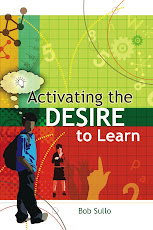It’s not uncommon for people to complain about
feeling frustrated. After all, it’s frustrating! But frustration can actually
be a good thing.
(Aside: Those of you well acquainted with Choice
Theory know that Dr. Glasser would probably encourage us to say we are
“frustrating” or “choosing to frustrate” rather than saying we are “feeling
frustrated.” That’s to remind us that all behavior - even uncomfortable
behavior like “choosing to be frustrated” - is a choice. We may be most aware
of the feeling component (“feeling frustrated”), but “choosing to be
frustrated” includes acting, thinking, and physiological components as well.
Still, since most people don’t engage in “CT-Speak” they are more likely to say
they are “feeling frustrated.”)
Humans are driven to experience a match between their
quality world pictures – how they want the world to be at that moment – and
their perception of the world at that moment. Feeling frustrated is the
perceptible mismatch between what we want and what we are getting and motivates
us to act. If we weren’t aware of the mismatch – if we weren’t “feeling
frustrated” – there would be no internal signal motivating us to change.
Even though none of us likes feeling frustrated, the
discomfort serves us well, motivating us to change our behavior to get more of
what we want.
What are the implications for the classroom? To start
with, an all-nurturing environment, one completely free of stress and struggle
is counterproductive. When there is no perceived discrepancy between what
students want and what they are getting, there is no frustration, no internal
distress signal, and no reason to change their behavior. The inevitable result
is a failure to grow and learn.
The most effective classroom environment is one where
the mismatch between what students want and what they have is sufficient to
motivate them but not so great as to overwhelm them. The best learning environments
are ones where learners want more than they have while remaining confident they
can experience success with reasonable effort. I want students thinking to
themselves, “If I work hard I will succeed and in order to succeed I must work
hard.” That’s an environment
that promotes student growth and achievement.
Frustration: it may be uncomfortable, but it is a
helpful signal that initiates change.
***
As
always, if you enjoyed this and found it useful, please send the link to your
friends. Thanks.
Bob
Sullo
For
information about books by Bob Sullo and to schedule a keynote, workshop, or
series for your school, agency, or parent group visit www.internalmotivation.net
Don't forget to get your copy of the revised edition
of The Inspiring Teacher: Making A Positive Difference In Students' Lives.






I like your statement: "Frustration: it may be uncomfortable, but it is a helpful signal that initiates change."
ReplyDeleteHopefully, it will motivate me to finish my thesis that up till now never ending. I am loss of spirit, but I don't know why is it happened for long time? Whereas I am sure that I must finish it soon.
Thank you, sir
Thanks for sharing your views.
ReplyDeleteA have attended some motivational programs in Luckow which is organized by Confidence Multiple Academy and the host person & speaker is Sameer Shaikh, Who's a motivational speaker, leadership consultant & business coach in Lucknow.